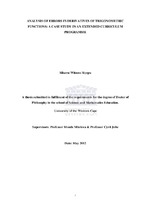| dc.description.abstract | The purpose of this study was to explore errors that are displayed by students when learning derivatives of trigonometric functions in an extended curriculum programme. The first aim was to identify errors that are displayed by students in their solutions
through the lens of the APOS theory. The second aim was to address students' errors by using the two principles of Vygotsky's socio-cultural theory of learning, namely the zone of proximal development and more knowledgeable others. The research presented in this thesis is a case study located in the interpretive paradigm of qualitative research. The participants in this study comprised a group of students who registered for mathematics in the ECP at Cape Peninsula University of Technology, Cape Town, South Africa. The study was piloted in 2008 with a group of twenty
students who registered for mathematics in the ECP for Chemical Engineering. In 2009 thirty students from the ECP registered for mathematics in Chemical Engineering were selected to participate in the main study. This study was conducted over a period of four and a half years. Data collection was done through students' written tasks; classroom audio and video recordings and indepth
interviews. Data were analysed through categorising errors from students' written work, and finding common themes and patterns in audio and video recordings and from the in-depth interviews.
The findings of this study revealed that students committed interpretation, arbitrary, procedural, linear extrapolation and conceptual errors. Interpretation errors arise when students fail to interpret the nature of the problem correctly owing to over-generalisation of certain mathematical rules. Arbitrary errors arise when students behave arbitrarily and fail to take account of the constraints laid down in what is given. Procedural errors occur when students fail to carry out manipulations or algorithms although they understand concepts in problem. Linear extrapolation errors happen through an overgeneralisation
of the property f (a + b) = f (a) + f (b) , which applies only when f is a linear function Conceptual errors occur owing to failure to grasp the concepts involved in the problem or failure to appreciate the relationships involved in the problem. The findings were consistent with literature indicated that errors are based on students’ prior knowledge, as they over-generalise certain mathematical procedures, algorithms and rules of differentiation in their solutions. The use of learning activities in the form of written tasks; as well as classroom audio and video recordings assisted the lecturer to identify and address errors that were
displayed by students when they learned derivatives of trigonometric functions. The students claimed in their interviews that they benefited from class discussions as they obtained immediate feedback from their fellow students and the lecturer. They also claimed that their performances improved as they continued to practice with the assistance of more knowledgeable students, as well as the lecturer. This study supports the view from the literature that identification of errors has immense potential to address students’ poor understanding of derivatives of
trigonometric functions. This thesis recommends further research on errors in various sections of Differential Calculus, which is studied in an extended curriculum programme at Universities of Technology in South Africa. | |

